Related Blogs
Table of Content
- What is HIPAA Compliance?
- Does Your Medical Software Development Company Really Need HIPAA?
- Key Features for HIPAA-Compliant Custom Healthcare Software Development
- Basic Features Included for HIPAA-Compliant Software Development
- Standard Process for Healthcare Organizations to Monitor HIPAA Compliance Software
- Why is HIPAA Compliance Important for Healthcare Service Providers?
- What are the Fines Under Violation of HIPAA?
- Checklist for Creating and Auditing HIPAA-Compliant Healthcare Apps
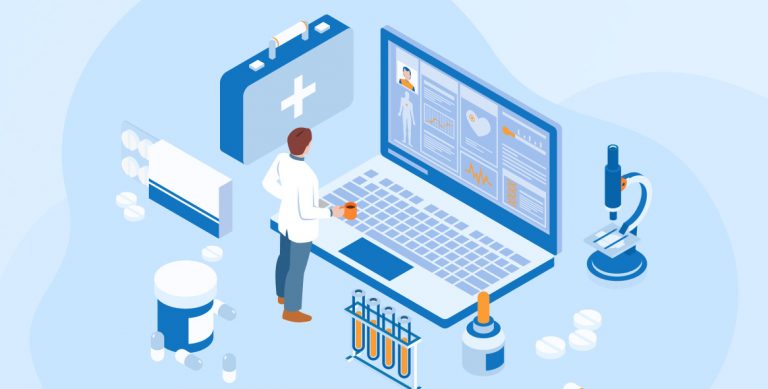
Sustainability of the medical industry is strongly dependent on how much they innovate and stay ahead with exponentially growing technological changes. As observed, the medical industry has grown immensely in the last few years and it has become a necessity to have an Electronic Health Record (EHR) system for a healthcare provider that makes the process easy for all the stakeholders and patients. In certain countries, preserving electronic health records is mandatory for health care providers.
Understanding the sensitive nature of the medical industry, it holds a huge responsibility on the shoulders of healthcare providers to take ownership of data and keep it secured. Similar to all other industries, healthcare service providers are interested in building trust and maintaining transparency across all the processes. And the same should be reflected through the EHR systems being used by the health care providers. However, this does not seem an easy job if we look at the figures of data breaches that happened in 2019 which costs 41.11 million records disclosed. In some cases, disclosing and misuse of the data could be life-threatening. Then what could be the workaround?
From a healthcare software development point of view, Health Insurance Portability and Accountability Act (HIPAA) is a compliance law that will help businesses build secured quality software for preserving and sharing Electronic Health Records (EHR).
There have been constant upgrades to this law since its first release in 1996 and accordingly, software development in the healthcare industry needs to be continuously monitored using the HIPAA compliance of software requirements. We have researched and developed this extensive blog to help you understand the vital parameters and structure contributing in developing HIPAA compliant healthcare software.
What is HIPAA Compliance?
HIPAA is the Health Insurance Portability and Accountability Act, released in 1996, to protect patients’ health data in all forms by introducing important sets of rules and standards. This health data should not be disclosed without patients’ consent or prior permission. Healthcare organizations associated with Protected Health Information (PHI) must take necessary measures to ensure the security of patients’ medical information that meets HIPAA requirements. It is mandatory for any organization to be HIPAA compliant so as to secure the medical information of patients, their payments-related information or any other medical details that can be accessed by PHI of the patient.
HIPAA has the following Main Purposes:
Privacy of Patient’s Healthcare Data
The data privacy requirement includes a patient’s personal information as well as clinical history, lab reports, medication and other payment-related information that should not be disclosed. However, in some cases, a patient’s EHR access can be accessed or shared with a patient’s prior permission.
Safeguard Patient’s Electronic Data
PHI (Covering patient’s healthcare information) should be securely stored and various encryption methods to be used for data transport over a secure channel. Database encryption and file storage should also use encryption and sensitive information should not be stored in plain-text form.
Secure Administrative Structure
This requirement is to reduce paperwork and make information clear and easily accessible at a centralized repository securely. Some of the defined standards of HIPAA include.
- Transmission of Electronic data: Exchange of data between two parties to carry out administrative or financial activities must include accurate information. For example, medical insurance providers can request information for the settlement of claims, it should include all the appropriate information to increase the efficiency of the communication between two parties.
- Structured Classification: Medical records are structurally bifurcated into the following categories:
- Diagnosis
- Procedures
- Lab reports
- Medication
- Equipment and suppliers
- Special Identifiers: Every record has a unique key to identification. For example, an Employee identification number, a 10-digit unique National provider number.
- Rules & Regulations of Operations: This section defines a specific set of rules to operate which information should be included for the electronic exchange of information and which not. These rules make the task easier and safer for administrative transactions.
Transferable Insurance
HIPAA offers employees exclusive coverage of existing health issues within their insurance and coverage which means the employer cannot exclude current health conditions in the insurance plans. With the same intent, it also offers employees an opportunity to register in a group health plan for case when coverage is lost or uncertain events have occurred. This Act does not discriminate against employees or their family members based on health factors. The access rights to PHI are limited to authorities only but any individual can renew the insurance policy whenever needed.
Preventing Health Care Fraud and Abuse
With the additional set of security rules, HIPAA gives an authority to prevent healthcare fraud, breach of information, and individual abuse.
Medical Saving Accounts
HIPAA has a standardized structure rule under the government Pre-tax policy for Medical savings accounts (MSA). Employees benefit under this rule that covers all the health provisions.
Does Your Medical Software Development Company Need HIPAA?
Any organization that collects or holds or shares the patient’s protected information which is going to be used for the course of treatment has to be HIPAA compliant. If your medical software/service does not include this then HIPAA compliance is not required for it.
Let us understand the main factors that determine if your application will be regulated by HIPAA or not:
User Entities
There are mainly two types of User entities:
- Covered Entities: These are the people who directly work with patients like Physicians, hospitals or insurance providers.
- Business Associates: Business Associates are the entities responsible for data collecting, storing, processing and sharing. For example, a custom healthcare software development company that builds software for the medical domain. This also includes the third-party services being used by the software/service i.e. Cloud services, hosting, etc. They also need to be HIPAA compliant.
Medical Data Type
Every medical data conveying information about a patient’s details would be defined as protected health information (PHI). And this PHI must be guarded against all the risks (data leak, data modification which may result in wrong treatment).
Different Software & Their Specification
Developed software must ensure that unauthorized people should not be able to modify electronic patient health information. A proper authorization will help ensure the data integrity part. Also, the medical software must have audit controls that help keep a track of all the modifications made to PHI that will help in the event of a data breach. Sensitive information like password and billing information should be stored in encrypted form to data stores so it cannot be purloined easily.
Key Features for HIPAA-Compliant Custom Healthcare Software Development
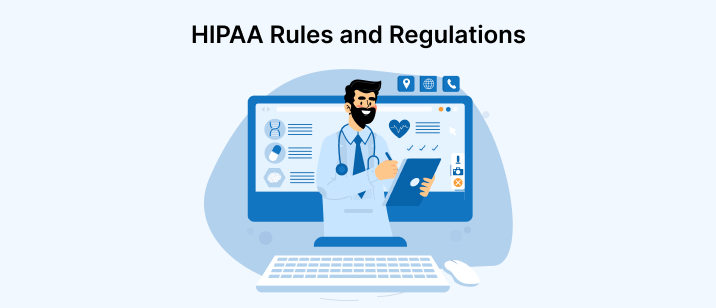
Manual based storage methods have specific limitations and since it is managed by humans, it comes with a higher tendency to make mistakes. Electronic Health Record is the solution to this problem. Computer databases allow users to increase usability, mobility, and efficiency when it comes to data processing and storage. However, electronic data storage methods reduce additional risks because healthcare providers implement modern tools and techniques for protecting their electronic data.
The Health Insurance Portability and Accountability Act (HIPAA) regulations are divided into the following standards or rules:
- HIPAA Privacy Rule: Protected healthcare information includes which information is protected, and how protected health information can be used. The privacy of data represents guidelines from the PHI Protection Act where information regarding patient personal details, clinical history, diagnosis, medical records, payments for healthcare treatment, and any other information related to health care must be protected without making it unavailable to third parties.
- HIPAA Security Rule: HIPAA Data Security rule has established national security standards concerning the protection of vital information of a patient’s health that is being stored or transferred in digital form. As per the standardized rules, the patient’s health information is made available to authorized users with definite access rights and rules. The basics of HIPPA security rules include necessary technical, physical, and administrative prevention to ensure the confidentiality and security of electronic information. According to this rule, all entities, that have access to PHI (covered entities), must conduct a regular data breach risk analysis activity to ensure reliable PHI protection.
When developing and implementing Security Rule compliance safeguards, covered entities, and their business associates may consider the following things:- Size, complexity, and capabilities
- Hardware and software infrastructure
- Costs of security measures
- Likely and possible impact of risks to protected health information
- Enforcement Rule: The HIPAA Enforcement Rule covers investigation provisions and details specific financial penalties when a data breach occurs. There is a penalty amount issued in case of any data breach which is dependent on the number of medical records disclosed and the frequency of data breaches occurred within a specific organization.
- Breach Notification Rule: This section of HIPAA creates an alert through a notification to all the entities and business associates including the affected individuals, if any tampering of data occurs or protected health information is transmitted to unknown sources. Most notifications to all affected individuals must be provided without unreasonable delay and no later than 60 calendar days following the date of discovery, if the breach involves more than 500 individuals, media must also be notified. If there is a data breach for, say, less than 500 individuals, then the healthcare organization needs to notify all affected individuals within 60 days immediately after the breach is discovered.
- Omnibus Rule: The Omnibus rule mandates changes to privacy, security and modifies breach notification requirements, among other provisions. The rule promotes patient privacy protections, provides individuals with new rights of health information and supports the government’s enforcement with penalties under this law.
Maintain Accurate Documentation
Just like every other industry, the fundamentals of developing healthcare software starts with documentation. The software documentation facilitates overall documentation to help healthcare providers implement these developed applications in their organizations. In order to keep your documents up to date, you need to constantly revise and add necessary information to it.
HIPAA based Software Certification
Healthcare service providers must ensure that they are HIPAA compliant, so they can periodically do self-audits and assessments, without including any third-party.
Additionally, even with third-party certification, you and your company are still accountable for ensuring HIPAA compliance. There is no safety protection from violations by having a third-party certification.
Basic Features Included for HIPAA-Compliant Software Development
Every developed healthcare software needs to undergo HIPAA-compliance as per the standardized measures. An organization must take all the precautions needed to secure data of patients as per PHI guidelines. HIPAA-compliant software can be implemented using any technology solution but the basic requirements under HIPAA-compliant software guidelines include:
Technical Preventive Measures
The Technical Preventive measures focus on the important features included for technical safeguards. The PHI data needs to be transmitted beyond firewall security and must be secured as per NIST standards so that any unauthorized user cannot modify or tamper this data. Enlisted are a few of the important features:
- Authorized User Access: Only authorized users are allowed to access the software and sensitive information. Also, a covered entity should not be able to access the information of other covered entities unless they are working with some health firm, payments or insurance.
- Specific User Identification: Each user has a unique identification. Using that, we can connect the user’s PHI with their identity proof. For example, In the USA, PHI can be linked to a person’s Social Security card for specific user identification.
- Emergency Situations and Back-up: The healthcare software algorithm should adhere to emergency conditions like server inaccessible, users should be able to access the data. A possible resolution to that is regular data backups. These backups can be used to make the system operational at times. Also, always-on availability features in cloud hosting could be used to provide continuous access.
- Security of data transmission: Unauthorized users should not be able to track the network or interrupt the transmission of data.
- Integrity and Safeguarding: The software must use a secure SSL/TLS channel for data transmission. Also, the environment should be secured with firewalls, multi-factor and passwords.
- Encryption requirements of Data: Data like Emails, messages, attachments, etc. transmitted beyond the firewall security must be encrypted to add a higher security measure.
Preventive Features – Physical
Preventive features – Physical focus on physical access to PHI irrespective of its location. PHI could be stored in servers, external clouds or any other electronic information system. It also covers the security of mobile devices or any other hardware against unauthorized access.
- Individual Access Control: Ensure only authorized employees get physical access to the servers, external cloud or any other electronic information system.
- Contingent Situations: Accidental situation operations include data backups, disaster recovery and data accessibility in emergency mode.
- Data Safety Plan: This includes the physical safety of PHI storage devices. The data safety plan for facility access control should be well-defined, structured & documented.
- Record Storage & Maintenance: Every record must be registered and maintained properly for all hardware used containing records of user changes. Also, document repairs and modifications to the hardware should be recorded to their exact copy which can be retrieved later.
- Other key features in Hardware Security include:
- Automatic logoff after a specific time duration of inactivity.
- Continuous use and timely update of antivirus software.
- Web filtering includes the restriction on potentially malicious websites that can harm the hardware or software.
- Periodic monitoring of user login logs.
Device and Media Controls (Authorized Devices Regulations)
The healthcare service provider must manage how secured electronic health information is transferred/removed/disposed from the devices if the user leaves the organization or the system is re-used, sold, etc.
- Regulation of Digital Data: The data can be permanently disposed of when it is needed. Yet, you will have to consider all the places where data can be archived, and you will need to ensure that all of those backups will be deleted and disappear.
- Re-use of Digital Data: It requires the removal of electronically protected health information from electronic media before the digital data are made available for reuse.
- Accountability to safeguard information: Healthcare Service providers must maintain accurate records of employees accountable to manage any kind of movement of hardware or electronic media associated with PHI.
- Automation of Data Retention and Storage: The data collected, stored and used needs to be backed up so as to recover anytime. The data backup and Recovery plans must have written procedures and must be documented. The reserved copy should be stored in a secure environment and followed by the best practices, it should have multiple backups that are stored in different locations. Also, the copy should be retrievable if the hardware or electronic data is damaged.
- Email Retention: Email retention solutions generally upload emails to the servers in an encrypted format. For any legal purpose, authorized person upholds all the rights to retrieve emails as and when needed and can view the patient’s PHI.
Administrative Security Measures
Some guidelines are mandatory for any business that works with the management of health-related information. Thus such business requires mandatory guidelines to follow while working with health-related information management. Administrative security measures fall under the category where one should keep an eye on the HIPAA policies and guidelines that business is following.
There are several administrative tasks that need to be performed to maintain administrative security.
- Appoint security officers who will regularly perform the risk assessment. Officers will ensure that the privacy program is good enough to maintain the integrity of PHI. He/she will regularly perform a risk assessment to check disaster recoveries, unauthorized access to PHI, and the mechanism for storing and managing electronic protected health information (ePHI).
- Introduce risk management policies and procedures.
- Organization policies should be designed in a way that it should manage all the possibilities and criteria where there is a risk of a security breach or data leak.
- Train employees properly on identifying potential cyber-attacks and document all training periodically.
- Organizations should manage all the related documentation regarding the functionalities and services that are being provided and the data that are being stored.
- Employees should be aware of the area where there can be cyber-attack and how to prevent it.
- There should be a strict restriction regarding ePHI Accessibility. One cannot access ePHI from outside the organization.
- Develop a contingency plan to protect the integrity of ePHI, consider data backups and procedures to restore lost data in case of emergency.
- There should be regular or period data backup Plans and procedures to manage the data recovery in case of data deletion or data corruption. So that in an emergency Organization can recover and restore the lost data.
Standard Process for Healthcare Organizations to Monitor HIPAA Compliance Software
Perform regular Self-Audit and Bridge the GAP with necessary Healthcare Software Updation
HIPAA conducts regular surveys to ensure HIPAA compliance strictly followed by healthcare organizations and covered entities. Custom Healthcare software or mobile apps must pass through regular audits from HIPAA authorities to provide quality healthcare services with a complete view on their compliance level. Self-audits generate results which are helpful for in-depth machine analysis and risk forecasts.
Must be able to create and execute remediation plans based on self-audits result information.
Self-audits help you to find and understand vulnerabilities in your compliance. Once you find the vulnerable issues, based on shortlisted issues make an effective plan for the solution. And that’s exactly where a pre-made redemption plan will come in handy.
After creating suitable remediation plans for identified vulnerabilities, now it’s time to conduct measures which will help to avoid human error. Design custom policies and procedures especially for your organization, it will help bridge the gaps in your company. In this case, applying generic strategies will not have any impact on your business.
Implement Secure Documentation Procedure with Audits
One of the important functions of the software is documentation management in the healthcare sector. In-fact, HIPAA compliance in software are essential, as its main benefits include secure storage and structured documentation management. The application simplifies the documentation process and it makes anybody completely ready for an unexpected audit.
Secure Protected Healthcare Information (PHI) From Internal Data Breach
Blinders don’t address the specialties of your institution and don’t consider your current system into account; thus, your HIPAA compliance application should help you build appropriate procedures and policies in order to avoid PHI breaches.
Furthermore, Impactable employee training programs of application will help your staff to be aware of cyber threats, possible scenarios of data breaches, also they will learn how to maintain and ensure PHI security.
All healthcare providers and insured persons are always at risk of disclosing medical records and violating HIPAA principles. An open laptop can cause hefty fines for data breaches. Hence, HIPAA compliance software needs to record and analyse incidents for you. If the solution cannot prevent the violation from occurring, then this failure should be analysed to avoid such a situation from recurring. In addition, the software must automatically report cases of OCR (Office of Civil Rights) in case of violations.
Secure Protected Healthcare Information (PHI) From External Data Breach
Healthcare Organizations hire business associates (Healthcare Software Development Company) that handle ePHI. The HIPAA regulates relationships between Service providers and their business associates. The HIPAA Rule mandates Business Associate Contracts (BACs) made between business associates and healthcare organizations. Moreover, the arrangement must track the consenting of the arrangement by all business associates and monitor the manner in which they handle ePHI to make sure you work with a reliable partner.
Insight all the breach clauses clear with your medical software development vendor. In case of information breached by a vendor or any third party BAC always helps you stay protected as a Healthcare organization under such circumstances.
Why is HIPAA Compliance Important For Healthcare Service Providers?
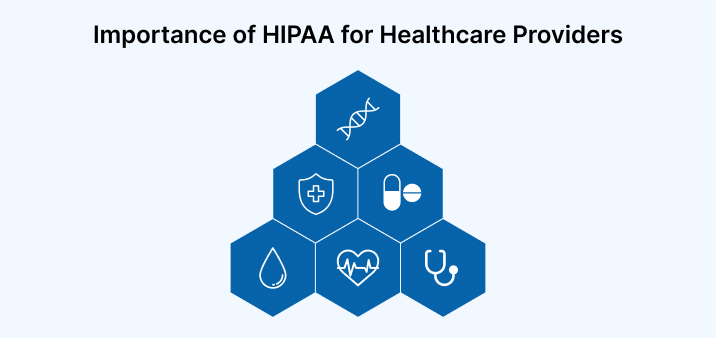
As we know, HIPAA compliance is now a legalized requirement from 1996, also a key factor for patients and healthcare institutions. Take a look at the principle benefits of the Health Insurance Portability and Accountability Act.
Data Transparency For Patients
Any healthcare team wants to build up trust between patients, urging people to declare their clinical histories in the fullest detail. Sometimes, people keep away information like their mental health issues, or substance misuse, because they don’t know it will be stored securely.
Patient’s hidden details have the key effect at long last diagnosis, which wouldn’t lead to accurate estimates and indeed not good for their health. If their institution has implemented full HIPAA Compliance and treats their data responsibly, they will be much more likely to offer higher patient satisfaction.
Maintaining Organizations Positive Stature
Security breaches are very costly, and not just because of the direct expense of the breach. The reputation results of a data crisis far outweigh the economic ones. Your institution can lose patients’ trust; investors and patients disappoint and receive a lot of negative press. The general public outbreak can be difficult to control and avoid, once the institution has undergone the breach.
HIPAA compliance consists of a set of practices that allow a medical institution to avoid these risks. Getting a HIPAA certification for Software that proves the institution’s commitment to data security and patient’s privacy.
Improved Conversion Rates
Healthcare service providers can process improved healthcare services to their patients with minimum data error, proper diagnosis, and fewer chances of breach of privacy, proper coordination and accurate billing. This ultimately results in improved conversion rates for business.
Save Extra Expenses
Healthcare Organization saves unnecessary expenses due to less monotonous paperwork, improved data security, human error, reduced duplication of testing and improved health.
Reduce the Risk of Paying Heavy Non-Compliance Penalties
If a healthcare institution failed to meet HIPAA standards then a HIPAA violation can be worth up to $1.5 million for them. The U.S. Department of Health Services has a Security Risk Assessment tool any organization can use for their compliance check. Your organization follows HIPAA’s all regulations or not, it is decided by their platform. If you are not HIPAA compliant, building HIPAA compliant software should be your high priority.
What are the Fines Under Violation of HIPAA?
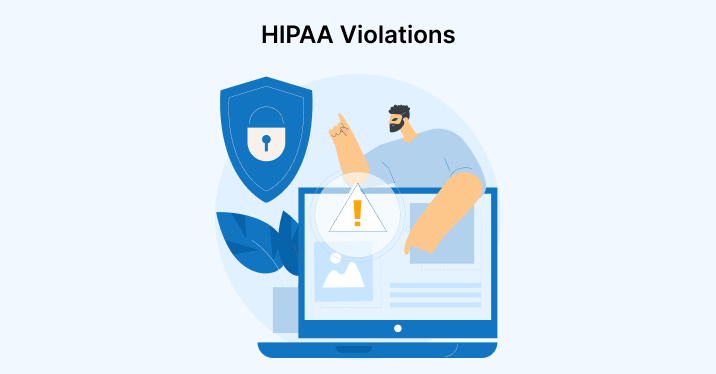
After all these things, you may think “Is passing between all these troubles worth it?”
You should build an application with an aim to achieve HIPAA compliance as this certification presents you as a brand in the healthcare market. It also creates a stronger and better image in public as well as medical professionals.
There is one more reason to go for HIPAA compliant healthcare software development. If you don’t follow HIPAA standards and if there is a security breach attack and data are leaked from your health application, then you will be responsible to pay fines as per court orders. Data security is your responsibility and hence you are responsible for the civil penalty ranges from $100 to $50,000 per violation per user.
So, if any time breach security of about 1000 user’s data and as per court orders you have to pay a $1000 fine per user then you will be paying $1,000,000 for this case. It doesn’t matter if data is very valuable or not.
Checklist for Creating and Auditing HIPAA-Compliant Healthcare Apps
After discussing all this, remember that HIPAA is not a body that will protect you in case of a data breach. This act has been made to protect the PHI of patients and so make sure your solution is robust enough to prevent such attacks in the first place. Consider going through the checklist below before you plan to partner with Healthcare App development company or any other healthcare software solution provider.
- Does your Healthcare organization need to be HIPAA compliant? If your solution does not hold or share PHI then HIPAA compliance is not required for you.
- Choose an experienced custom healthcare software development company for your custom software. It is always very critical to build secure healthcare software. Always work with a development company that has good experience in building HIPAA compliant software solutions. Their experience and expertise will save you from many possible threats.
- Sign a BAC (Business Software Contract) with Healthcare Software Development company. Always sign a BAC for all third-party services including cloud services and hosting providers. BAC will protect you from the damage done by third parties.
- Manage transparent Privacy policy with patients. Mention the privacy policy for the sign-up process which should cover all aspects. Get confirmation from the users that they have read and agreed to the privacy policy.
- Collect and Store only required information. Only collects the minimal information that is required for your software. While exchanging or displaying data, display/exchange only the required information. Dispose of the data which is no longer required. For example, for file download, always use process memory rather than storing on the temporary physical location and memory can be flushed after the download.
- Keep important data secure with proper encryption and cloud Storage. Keep the sensitive information stored in encrypted form. Avoid features that do not have encryption support. I.e. SMS, push notifications. Do not put any data on any Android or IOS device. Always use HIPAA-compliant data stores or cloud stores. Do not store information on Android or iPhone devices or unsecured client storage.
- Regulate User Accessibility with Advanced Data Protection. You need to make a balance between user accessibility and data protection. Provide easy-to-use and safe interface with only required information being visually appeared on the UI. Use a strong password, multi-factor authentication, Authorization, additional authentication for the sensitive interface, short session timeouts, etc.
- Hire a Professional Business Analyst. Do periodic audits of your healthcare software and Hire a professional business analyst to make sure all the HIPAA and PHI regulations are being followed by a solution and take advice for the improvements. As security features of HIPAA keep updating regularly, Periodic Audits always keep your healthcare software updated with the HIPAA set of rules.
- Keep an eye on Internal and External breach. Your organization or healthcare software Development Company doesn’t need to be always guilty of breaching important information. So always keep an eye on internal and third-party security breaches of information to safeguard your business.
Technical checklist:
- Data transmitting outside the firewall security should be encrypted
- Hardware storing the PHI data should be physically safe
- Backup the data of hardware before changing its owner
- Risk management to check data breach and cyber attack
- Restrict third party access of ePHI
- Data recovery and data backup procedures for emergency

Kamal Sharma
Kamal Sharma is a VP of TatvaSoft which is a custom software development company. He is an accomplished Business Strategist and Tech Visionary with wide-ranging experience in the technology sector. He leads the business operations of the company and creates vision & strategic goals for his colleagues.
Related Service
Healthcare Software Development
Know more about our Healthcare Software Development Service
Learn MoreSubscribe to our Newsletter
Signup for our newsletter and join 2700+ global business executives and technology experts to receive handpicked industry insights and latest news
Build your Team
Want to Hire Skilled Developers?

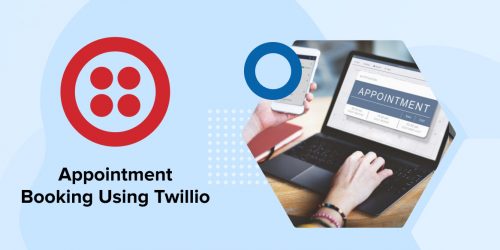

Comments
Leave a message...